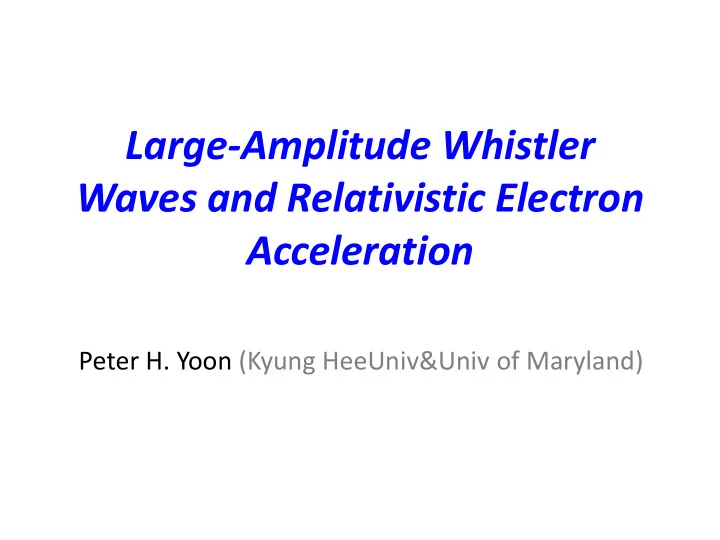

Large-Amplitude Whistler Waves and Relativistic Electron Acceleration Peter H. Yoon (Kyung HeeUniv&Univ of Maryland)
Cattell et al. (2008): Large-amplitude (200 mV/m or d B / B 0 ~ 0.01) oblique (40°-70°) whistler wave observed at high magnetic latitude (~ 20°).
Theories of Whistler-Acceleration • Omura and Summers (2006): – Inhomogeneous B field. Resonant trapped electrons forming electromagnetic electron hole. Coherent whistler mode. Acceleration of trapped electrons.
• Omura et al. (2007): – Extension of Omura& Summers (2006). Relativistic turning acceleration
• Omura& Summers (2006) and Omura et al. (2007) assume parallel propagation of whistler wave. • Cattell et al. (2008) STEREO observation is for oblique propagation angle.
Whistler Oscilliton Theory • Sauer et al. (2002) • Dubinin et al. (2003, 2007) • Sauer and Sydora (2010) • Coherent wave packets for whistler waves satisfying Gendrin condition.
Sauer and Sydora (2010) Note: The authors do not discuss electron acceleration.
Oblique whistlers • Tao and Bortnik (2010): Theory of oblique whistler and relativistic electron acceleration — using linear theory of oblique whistler wave. • Verkhoglyadova et al. (2010): Linear theory of oblique whistler wave — they do not discuss relativistic electron acceleration.
Nonlinear oblique whistlers
2D Geometry Wave propagation direction Oblique whistler wave
Initial condition
Oblq Whist Wave Dispersion Relation
B-field Wave propagation direction Oblique whistler wave
Relativistic e-acceleration Test-particle simulation over nonlinear whistler wave (cf., Roth et al., 1999)
Wave-particle resonance Wave-particle scattering (includes non-resonant wave-particle interaction)
Conclusion and Discussions • Rapid acceleration of relativistic electrons by obliquely-propagating whistler waves. • The problem of how these waves are created is outstanding. • Assuming that the source of oblique whistlers are near the equator, the propagation is not understood.
Recommend
More recommend